Rockbridge Academy Blog
Further Up and Further In—Library Stories of Life Together
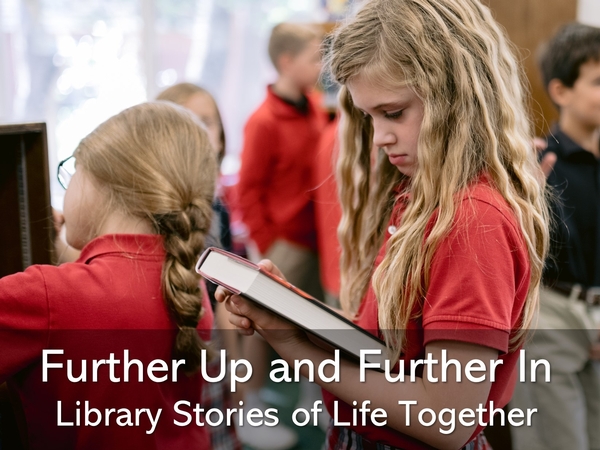
Boxes of books—moved and unpacked by many hands. That is how the present Rockbridge library began. Oh, make no mistake, Rockbridge always had a library, even before there was space for one. Great books have always been a defining thread in the culture of Rockbridge. It’s just that the books had to be placed on carts, in corners, on classroom shelves or tables, or wherever they could be safely tucked away and retrieved for use at suitable times. Now, however, over 10,000 books line the shelves of the school library, at the ready. The library still feels like a new attraction to many upper school students since the grand opening in September of 2022. Many grammar school students, on the other hand, will retain no memories of school without a library. As alumni wandered the halls before Christmas break during the Captain’s Cup, a few stepped into the library and one declared, “I am so jealous they have a library!” We don’t have books for the sake of having books, however. Stories bring us closer to one another and closer to our Savior. They bring us further “in.” As Aslan invited the children to come “further up and further in” in C.S. Lewis’ The Last Battle, come inside the library doors with me for a few moments to hear some stories.
As I step into the library each morning, flipping on the lights or entering to the sounds of beautiful music emanating from the instruments of rehearsing Rockbridge orchestra students, I am struck by the sight and smell of books—nostalgic memories flooding in from childhood days of library visits. These early-life visits being filled with wonder at what the pages hold from each book sitting on a shelf; imagining what journey each story will allow me to partake of or what tidbit of interesting information I can garner. Skip ahead a few years in memory to working in my university library…hoping during my shift that I’ll have some slow time in order to have a few minutes to comb through books in the special collections department or turn through the pages of a century-old newspaper…the corners of my mouth can’t help but turn up into a small smile as I pass through the Rockbridge library doors. After setting my things down, I retrieve the books that have been returned in the book drop, sort through books that have been donated, and collect the handwritten checkout slips, thrilled that the library has been used even during the “off hours.”
I think of the many anecdotes that have occurred over the past couple years in the library with students.
- I think of a kindergarten girl asking, “do you have any books about pink princesses?”
- Or, the 1st grade boy asking, “when are we going to get more books about snakes?”
- There are the instances of juniors or seniors telling me about their thesis topics and why they chose them.
- There’s the 9th grader’s eyes lighting up when they discover how many books we have about World War II!
- Then there’s the 3rd grader asking if we have any stories about dogs—she left the library with Because of Winn Dixie, only to come back a couple weeks later saying, “I love this book! As soon as I finish it, my mom said we could watch the movie together!”
- Then there’s a new upper school student perusing the library shelves and saying, “I love this series! I am definitely bringing in some books to donate!”
- Another instance is when a 2nd grader found a book on the shelf that had been consistently checked out by other students and exclaimed, “It’s finally mine!!!!”
- One of the sweetest things is seeing students in the hallway or after school saying, “Hi Mrs. St. Cyr! How’s the library?”
- There are dozens of other student stories, but I’ll end with a favorite. A junior kindergarten mom was in the building and expressed her thanks for our library. She said her daughter LOVES when her class visits the library each week. She told me she had been playing “library” at home with a table to check out books and had placed a bucket beside the table to serve as the “book return.” Oh, my heart.
I can’t help but share how amazing the Rockbridge faculty, staff, and community are as well. Through interactions and observations, I have experienced first-hand what it means to be part of a Christ-centered community.
- I think of Sam Ostransky bringing in theology classes and excitedly teaching them how to use Bible commentaries. Then he’ll stop by the library regularly to check out books for his small children at home—never neglecting to spend a moment at the library desk to give me an update on how my own children are doing in his classes.
- There’s Lysa Lytikainen or Caroline Master who spend a few minutes of work or a lunch break to get a moment by the sunshine streaming through the library windows. I absolutely love that Caroline is frequently pulling books off the shelves that she has looked up through the online library catalog prior to visiting.
- There are conversations with Andrew Menkis about Lewis or Tolkien.
- There’s Melanie Kaiss or Cheryl Mole bringing Mark Campbell into the library to check out books from his favorite Magic Treehouse series.
- There’s Bob Schingeck asking me to stage a joke with him at the circulation desk in order to elicit a giggle from a visiting class and brighten their day.
- There’s Matt Seufert, who provided me with the perfect scripture to use when I unexpectedly had to speak at a funeral.
- There’s Jacque Touhey, instrumental in the foundation of the library, checking in with wonderful ideas for helping the library thrive.
- There are Heidi Stevens and Laura Mathisen using their artistic and design gifts to discuss beautiful ways to make the library aesthetically pleasing to draw in students of all ages.
- There’s Therese Cooley using her art framing skills to repair a picture in the library that would have cost hundreds elsewhere.
- There are teachers who are at the ready and willing to help when I ask, “Can you bring your students to Story Time to share something they’ve learned?”
- When requesting recommendations for the book fair, there are book lists a mile long from Monica Godfrey or Matt Swanson.
- There’s a discussion with Monica Ault before the book fair about her recommendation of Anna Karenina and her love of the often difficult but profound Russian literature.
- There’s Kerry Anne Ward inviting me to a book club made up of mostly Rockbridge folk—where discussing Don Quixote or Kristin Lavransdatter with a savory treat in hand and a glass of sangria on the side just might be a little glimpse of heaven.
- There’s Stephen Unthank recommending publishers from which to request donations—and then receiving donations of many books from them!
- There’s Gretchen Geverdt continually bringing in donations because she makes it a point to go through books that the public library is disposing of to search for treasures.
- There’s Shannon Reich, to whom God must have given scheduling magic, who makes sure all the library events are perfectly placed on the calendar so as not to interfere with other events.
- There are beautiful moms who have used their time and gifts to make monthly story times special or design a gorgeous library bulletin board that evokes dozens of praises from passers-by.
- There are multiple parents who have stopped in the library and asked for our wish list so that they can be on the lookout for books to purchase and donate.
- There’s the added benefit of being in the library when classes bring in speakers and hearing talks about amazing topics from people like Chip Crane, Stephen Fix, Bryan Grube, or Matt Chwastyk.
- Being near the Beehive (library copy room)—may I please say that this active area is like no other workplace “water cooler” area I have ever witnessed? I’ve worked in several offices, and the places where people have the opportunity to converse are typically areas where people complain or gossip. The Beehive, however, is a place where there is uplifting conversation and offers of prayer and encouragement. It is a testament to how God is using this community.
- Jerry Keehner wheeling in carts of books from his personal library for students to use.
- An impromptu prayer time with Irma Cripe for a friend.
- A beautiful word of encouragement from Kim Ramirez or Chris Phillips. It is difficult for me to stop telling tales without writing a book!
Hopefully, these stories brought you “further up and further in” into life in the Rockbridge library. I think of how Aslan revealed himself to the Pevensie children through their experiences. They were ultimately drawn into the BEST story. At the end of The Last Battle, Lewis speaks of this story: “…the Great Story which no one on earth has read: which goes on forever: in which every chapter is better than the one before.” During a speech by Heidi Stevens at the library grand opening, she spoke of the time when the founding families of Rockbridge gathered together and what they envisioned. She said, “We longed for our children to recognize the great Story behind all good stories: the story of a King who is making all things right again and restoring his original pattern of what’s Beautiful, Good, and True.” May it be so.
Brenna St. Cyr has served in the Rockbridge library since its formation. She is currently pursuing her master's degree in Library Information Science and enjoys co-coordinating a food pantry at her church each week where she gets extensive community interaction. She has two children who attend Rockbridge, and she resides in Bowie, MD with her husband and children.
From our Library Grand Opening in September of 2022:
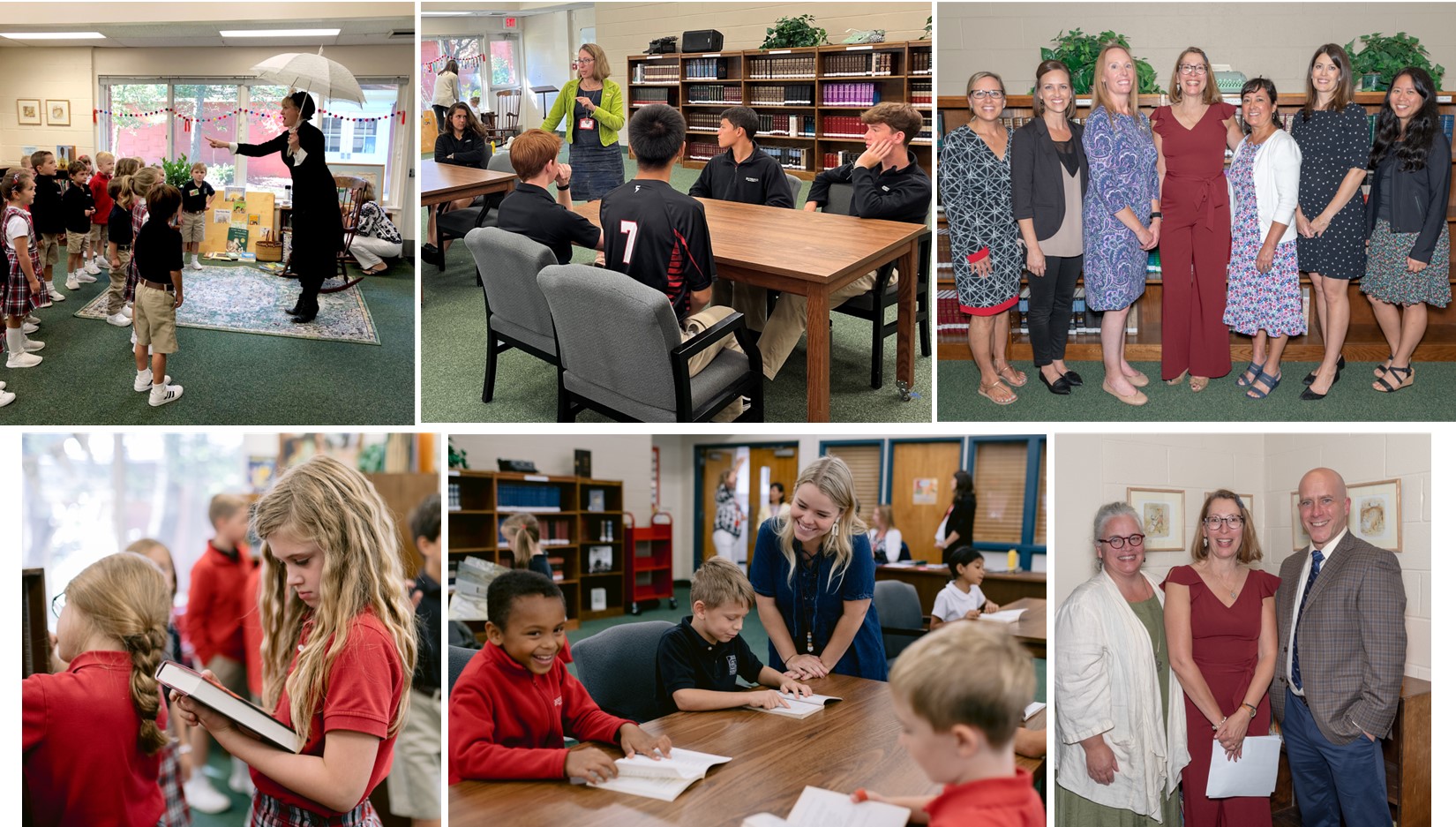
Loving Words and THE WORD
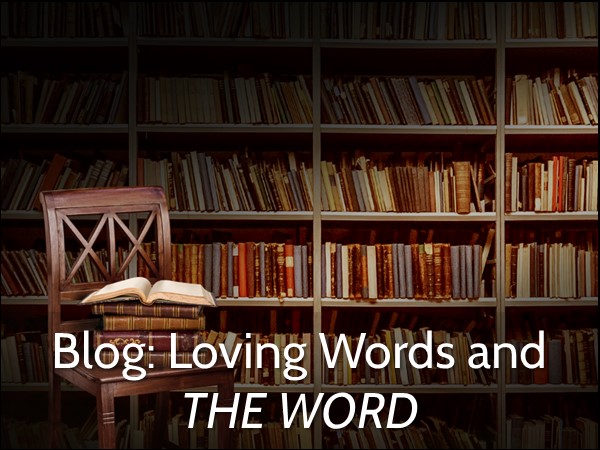
The following is adapted from a speech delivered by Heidi Stevens on September 29, 2022, at the Rockbridge Academy Library Grand Opening.
Long before Rockbridge Academy opened its doors in 1995—with three teachers and just shy of two dozen students—a small group of families gathered to dream and plan what a school like this could be. The founding families met together, read together, and prayed together, talking about building a place where our children could thrive and grow, where they could learn in an environment committed to academic excellence that encouraged them to take every thought captive to the obedience of Christ.
We loved our own children, of course, and dreamed of how a school like Rockbridge could come alongside and complement what God called us to as parents: training the children He’d given us to love their Creator with all their heart, soul, mind, and strength.
We also spent a lot of time talking about how what we were building should be built on a firm foundation that reached beyond our own generation. We spoke of cultivating a “500-year vision” for a place that would serve the parents of our community in educating our children’s children, and their children, and the children for generations beyond, if God would graciously bless and prosper the work.
In addition to talking about those things, you might be surprised to learn how that group of men and women regularly prayed for YOU. They prayed for you, and for your children, even as they went about the arduous work of building a school for their children.
Of course, we who were part of that younger Rockbridge Academy prayed fervently for our own children. But we knew that it was the next generation—and all the generations to come, long after we were gone - that would prove whether our work had been built on the right foundation or on shifting sand. Consider the communion of saints—across time—who prayed for YOU, the Rockbridge parents of the future! You were prayed for: that you would be found faithful in seeking to raise your children in the fear and admonition of the Lord.
There were so many other things prayed for, But one thing—of particular significance for this night—was the prayer that the future students at this school would be lovers of the Word … and lovers of words.
● Words! The means by which God chose to reveal Himself to His people, even before His incarnation as the Living Word.
● Words! The amazing vehicle of language through which so much of our learning happens.
● Words! The mysteriously powerful, beautiful medium through which we can bless or curse, bring healing or hurt, speak life or death.
● Words! The avenue of our understanding, the tool through which we read and speak truth, and the stuff of which stories are spun to captivate, delight, and lead.
And so, we dreamed of a library: of the smell of books and the lure of comfortable chairs; of a repository of the most wonderous stories and the greatest ideas of mankind; and of a gathering of the collected knowledge of God’s good Creation that has yet only begun to plumb the depths of its extravagant complexity.
We envisioned our children, and the many children to come, being enamored by tales of adventure that would whet their appetites for the real adventure of reigning and ruling as dearly loved sons and daughters of our Eternal Father King.
We smiled to think of our students being brought up on tales of bravery and valor, of justice and love, and all the other noble things that the truest and best stories are both made up of and point to.
We longed for our children to recognize the great Story behind all good stories: the story of a King who is making all things right again and restoring his original pattern of what’s Beautiful, Good, and True.
I was listening to an interview the other day with Carolyn Weber, whose memoir, Surprised By Oxford, is currently being made into a motion picture. Dr. Weber has been on the faculty of prestigious colleges across the United States and Canada, and she was the first female dean of St. Peter’s College, Oxford. She recently moved to middle Tennessee to begin teaching at New College Franklin, a small college that teaches the seven liberal arts—the trivium and the quadrivium—from a Christian perspective.
Knowing her vast experience but recognizing that many of the students she now teaches would likely have been classically educated, the interviewer asked Dr. Weber if she saw much difference between those young men and women and others from more traditional school backgrounds. Her answer struck me. She said that the classically educated students, for the most part, could “think in the dark” in a way that many of her past students couldn’t.
“They know how to think in the dark. They can think unplugged,” she said. “They don’t need Google and they don’t need gadgets.”
That description struck me, because it’s what we hope for in our students, isn’t it? We want them to be able to engage with what they read, regardless of genre, on its own terms. We want them to be able to open a book without opening their computers. To be able to dive in without needing the “light” of predigested information that will tell them what to think before they’ve even begun.
Will this library create that sort of student by itself? Will a library ensure that we have students who can “think in the dark”? No. But it’s evidence that we believe that sort of student will routinely inhabit these halls.
We want our students, who’ve been trained to read in such a way, to have this place to come and experience the riches you see around you. To be lovers of words who come here to be with—to pursue—ideas made incarnate on these printed pages. May they do so, reminded of that more excellent Word and truer Incarnation who came to be with—to pursue—us.
Heidi Stevens taught art and humanities courses for twenty years and now serves on the Rockbridge Academy Board of Directors. She and her husband, Rick, have two grown daughters, both Rockbridge graduates.
Why Do We Read Hard Books?
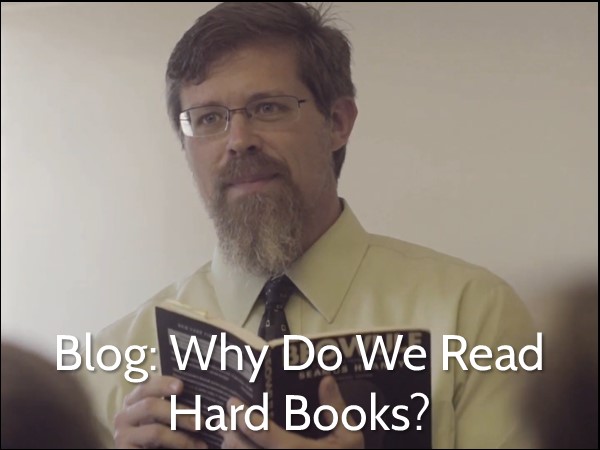
Paradise Lost. The first three times that I attempted to read this book on my own, I failed, never making it out of book 2. I was a literature teacher with several years of experience and at the beginning of my happy career at Rockbridge on my third failed attempt.
It’s a hard book. It’s a hard book, and Milton’s classical allusions, Latinate constructions, and theological asides were completely overwhelming to me, so I quit. I remember waiting at Annapolis Honda for my Civic’s oil change, trying to make sense of the thing. I finally abandoned the poem and comforted myself by asserting that “the Emperor has no clothes”: nothing that was this hard to slog through could be worth it.
And yet…
It is largely my fault that Paradise Lost is in our present 9th grade curriculum; I made my case to Ralph Janikowski and Mike McKenna in 2010, worked to maneuver Pilgrim’s Progress into the 8th grade curriculum to make room for Milton, and then, in the fall of 2011… My class load was reduced, I stopped teaching freshman literature, and I did not have the chance to teach the book for the next seven years. My deepest regret about that? Not having a chance to read Milton’s epic with Rockbridge students again.
And again.
And again.
Because it was a hard book, and it was worth it.
So let me address the question above: Why do we read hard books?
I freely acknowledge that, for their age and relative maturity, Paradise Lost is the hardest book in our curriculum for the students tasked with reading it… and then writing about it. I also acknowledge that, as I defend it, I am doing so from a place of sympathy: I know that it is hard, since I abandoned it several times myself.
Allow me first to challenge the assumption behind the question: “hard” is not the problem.
One of my favorite lines from A Tale of Two Cities describes Charles Darnay’s condition in London. The child of French aristocrats, he abandons their life and the wealth that came with it, moves to London under an assumed name, and is now making his way as a tutor. Dickens writes, “He had expected labour, and he had found it, and did it, and made the best of it. In this, his prosperity consisted.” As anyone who has read the book would know, the life of Darnay – with its labor, with its lower middle class trappings – is infinitely more rich than that of the aristocrats he left behind, at their ease but succumbing to their “leprosy of unreality.”
He chose a harder life not because it was hard, but because it was good.
And Paradise Lost, I will consistently argue, is good. Hard, but good.
In fact, looked at the right way, “hard” is just another way of acknowledging that the task involves cost: time, effort, the restructuring of the mind to grasp what is going on.
Thus, calling something “hard” is not so strongly negative as it first appears. In fact, looked at the right way, “hard” is just another way of acknowledging that the task involves cost: time, effort, the restructuring of the mind to grasp what is going on.
(An aside: what is the greatest benefit of math for any student? That it restructures the mind to think in a more organized, balanced, direct fashion. The constant query of, “When are we ever going to use this in real life?” thus entirely misses the point. In a very particular way, it does not matter if you ever use the quadratic equation again in your life; what you have gained is an ever-deepening ability to think clearly and appreciate something beautiful.)
Video games, which take us where we want to go anyway, are easy, and they alter the mind just as surely as potato chips alter my waistline. Healthy alteration of the mind is hard – as is the alteration of a pot-belly into abs of steel. The better abs, though, are not just useful for attracting a mate; they are actually a by-product of something that is just better for living: a healthy, fit body.
And struggling through math or Milton – leaning into the labor of it – can help to bring about that which is even more useful: a healthy, fit mind.
But people with abs of steel can be insufferably vain: this is true (I say this as a distinctly pot-bellied man). Is the goal of reading a hard book being able to look good because of my heightened mental acuity, just in time for next fall’s academic season? Of course not; the goal is to be able to get at the Truth, the goodness, the beauty that these works contain.
Greater minds than mine have defended the hard books of our curriculum for the goodness, beauty, and Truth found in them. I will add nothing to that here. I will confess that sometimes the complaint that “these books are too hard” arises because these books confront us with our own feebleness in the presence of something great (I write this as a confession of my own sins), and we have developed a society that tears down that which is great. Instead, we should see that, like a good, hard practice under the hot, August sun, the hard book prepares us for that which is even greater, for understanding and thinking more deeply, for going “further up and further in”.
Because the Bible, too, is a hard book, and we abandon the reading of it at our peril.
Instead, we should see that, like a good, hard practice under the hot, August sun, the hard book prepares us for that which is even greater, for understanding and thinking more deeply, for going “further up and further in”.
Summer Book List
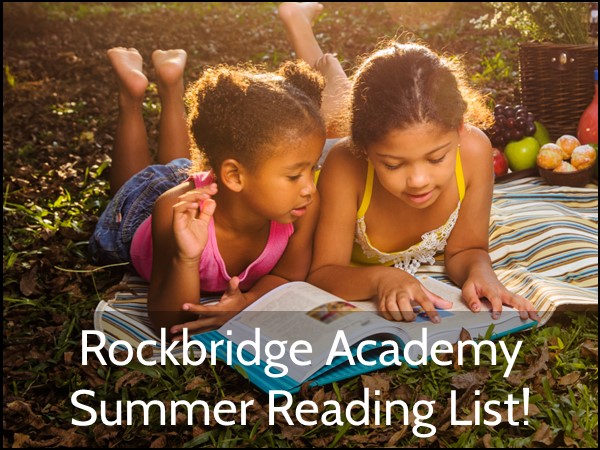
Summary: Across the country, families’ summer plans have changed drastically this year. In the wake of canceled sleepaway camps and postponed vacations, summer reading will claim its place more than ever as a critical defense against the creeping summer malaise. The Great Books broaden horizons when travel isn’t an option and don’t require any social distancing. Our literature department has compiled a list of some such books for the student body to tackle this summer; here’s a sampling of them:
GRAMMAR
- Amelia Bedelia — Peggy Parish
- Corduroy — Don Freeman
- Curious George — H. A. Rey
- Frog and Toad are Friends — Arnold Lobel
- The Garden of Abdul Gasazi — Van Allsburg, Chris
- How the Leopard Got His Claws — Chinua Achebe
- Madeline — Ludwig Bemelmans
- Mr. Popper’s Penguins — Richard and Florence Atwater
- Pippi Longstocking — Astrid Lindgren
- Shiloh — Phyllis Reynolds Naylor
- The Story of Babar — Jean de Brunhoff
- The Tale of Peter Rabbit — Beatrix Potter
- Where the Wild Things Are — Maurice Sendak
- Anne of Green Gables — L. M. Montgomery
- Chronicles of Prydain — Lloyd Alexander
- The Chronicles of Narnia — C. S. Lewis
- D’Aulaire’s Book of Norse Myths — Ingri and Edgar d’Aulaire
- Harriet the Spy — Lousie Fitshugh
- Hatchet — Gary Paulsen
- The Jungle Book — Rudyard Kipling
- Mary Poppings — Pamela I. Travers
- Matilda — Ronald Dahl
- Misty of Chincoteague — Marguerite Henry
- The Secret Garden — France Hodgson Burnett
- Swiss Family Robinson — Johann Wyss
- The Wonderful Wizard of Oz — L. Frank Baum
- Tuck Everlasting — Natalie Babbitt
Dialectic:
- King Arthur and His Knights of the Round Table — Roger Lancelyn Green
- The Adventures of Tom Sawyer — Mark Twain
- The Enchanted Castle — E. Nesbit
- A Tree Grows in Brooklyn — Betty Smith
- A Wrinkle in Time, Series — Madeline L’Engle
- Alas, Babylon — Pat Frank
- Novels — Agatha Christie
- Hound of the Baskervilles — Sir Arthur Conan Doyle
- Ender’s Game — Orson Scott Card
- Little Women — Louisa May Alcott
- Profiles in Courage — John F. Kennedy
- Gaudy Night — Dorothy Sayers
- The Lord of the Flies — William Golding
- The Martian Chronicles — Ray Bradbury
- The Scarlet Pimpernel — Baroness Orczy
- To Kill a Mockingbird — Harper Lee
- Treasure Island — Robert L. Stevenson
- Amazing Grace — Eric Metaxas
- Fahrenheit 451 — Ray Bradbury
- Frankenstein — Mary Shelley
- My Early Life — Winston Churchill
- Raft — Stephen Baxter
- Robinson Crusoe — Daniel Defoe
- The Lord of the Rings, Trilogy — J. R. R. Tolkien
- The Three Musketeers — Alexander Dumas
RHETORIC
- The Music of Pythagoras — Kitty Ferguson
- The Source — James A. Michener
- Complete Sherlock Holmes — Sir Arthur Conan Doyle
- How Should We Then Live? — Francis Schaeffer
- The Killer Angels — Michael Shaara
- Mere Christianity, Abolition of Man, Screwtape Letters — C. S. Lewis
- Notes from the Tilt-a-Whirl — N. D. Wilson
- The Old Man and the Sea — Ernest Hemingway
- Things Fall Apart — Chinua Achebe
- Uncle Tom’s Cabin — Harriet Beecher Stowe
- The Chosen — Chaim Potok
- Isaac Newton — James Gleick
- Mathematics: Is God Silent? — James Nickel
- Autobiography — Benjamin Franklin
- Thee Confession, City of God — St. Augustine
- The Count of Monte Cristo — Alexandre Dumas
- East of Eden — John Steinbeck
- The Good Earth — Pearl S. Buck
- He Leadeth Me — Walter Ciszek
- Heart of Darkness — Joseph Conrad
- The Last of the Mohicans — James Fenimore Cooper
- North and South — Elizabeth Gaskell
- Anna Karenina, War and Peace — Leo Tolstoy
- Les Miserables — Victor Hugo
- Middlemarch — George Eliot
These books represent some of the Great Books, spanning many different eras of literature, that have shaped Western thought and informed much of its progress. Classical education depends on both looking around ourselves at contemporary works and on looking backwards to the great works that have come before. They may report ideas that deserve a meticulous perusal or describe a completely unfamiliar world, but above all else, they offer enchanting stories that have captivated many generations of learners and will continue to captivate readers.
Emily is excited to build the Rockbridge Blog to highlight the community that educated and guided her. She is now studying Economics at Hillsdale College, where she’s a captain of the sailing team and an editor of the Hillsdale Blog.
